Update #3: Thursday, April 15, Paris, France, 14:13
TAKEAWAY: The program for The Power of the Tablet conference at Poynter, June 14-15 has now added Jennifer Brook, of The New York Times, presenting the case study of how the Times prepared for its iPad app. ALSO: A new generation of student journalists who don’t Google enough?
The Power of the Tablet: program shaping up!
For application and more information:
http://www.poynter.org/seminar/seminar.asp?id=5515
We now confirm two more presenters for our The Power of the Tablet conference: Jennifer Brook, of The New York Times, will discuss how the Times planned and introduced its iPad app; William Couch, of USA Today, will do the same for USA Today’s iPad app.
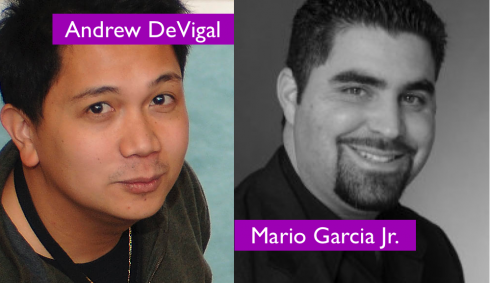
Andrew DeVigal (The New York Times), storytelling thru photo/video; Mario Garcia Jr. (Garcia Media) resource person on tablet usability
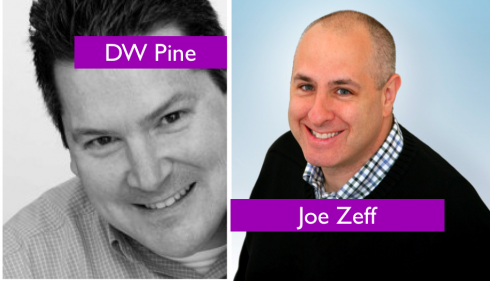
DW Piine (TIME Magazine) to present case study of Time; Joe Zeff (Joe Zeff Design) to discuss multimedia/advertising opportunities
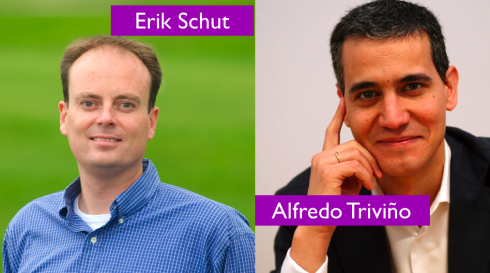
The Power of the Tablet Conference at Poynter: Erik Schut (WoodWing), Alfredo Triviño (News Corp, London) among headliners presenting
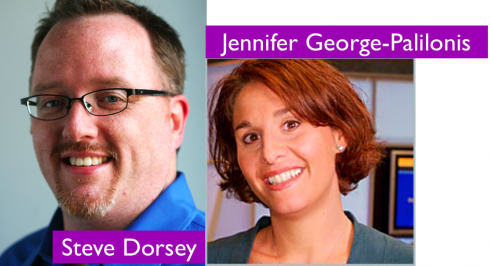
Steve Dorsey (Detroit Free Press); Prof. Jennifer George Palilonis (Ball State University) at the Poynter conference
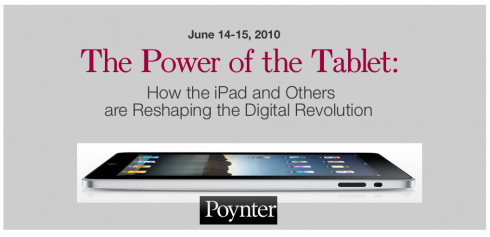
For application and more information:
http://www.poynter.org/seminar/seminar.asp?id=5515
As our program for The Power of the Tablet conference shapes up, we can now confirm that Erik Schut, president of WoodWing, the company that worked closely with TIME Magazine as it introduced its iPad edition this month, will be among the speakers.
Who should attend?: I am happy to see that interest rates so high for this conference, as shown by the many phone calls and emails that I am receiving daily from across the world. One question frequently asked is “who is this conference for?”.
Well, it is for anyone in the industry who contemplates a tablet edition of his/her newspaper or magazine. This should be EVERYONE, in my book. The conference will be an introduction to what you need to know to get out of the gate, from storytelling and presentation modes in the new medium, to the technological solutions available to take you from your current editorial system and into a tablet, advertising opportunities, and, of course, the question that many in the industry ask daily: how can the tablet offer us revenue producing strategies.
Other confirmed speakers so far: Alfredo Triviño, Director of Creative Projects, News International (London). Al leads the process of visualizing and showcasing potential products for all News International titles—from print to mobile and tablet apps. Al has been working with tablets since 2007 when he invented the Newsbook, a platform where to read, view, listen to, share and store newspapers, books and magazines. Some of the ways
of editing and delivering content that are central to the Newsbook will be tried out for the first time with The Times and Sunday Times iPad apps.
Also confirmed speakers and resource persons at the conference: D.W. Pine, design director of Time Magazine; Jennifer George-Palilonis of Ball State University; Joe Zeff of Joe Zeff Design; Gary Cosimini of Adobe; Steve Dorsey, vice president, research and development, Detroit Media Partnership and Mario Garcia Jr., Garcia Media.
It is an exciting return to The Poynter Institute for Media Studies for me, as I have been invited to organize and to direct this key seminar, The Power of Tablets: How the iPad and Others are Reshaping the Digital Revolution. Working closely with my Poynter colleagues Stephen Buckley, interim dean at Poynter and publisher of Tambay.com, the digital publishing arm of the St. Petersburg Times, and Regina McCombs, faculty for multimedia and mobile at Poynter. we are still crafting the program, but I know that anyone seriously considering publishing tablet editions will benefit from attending the one and a half day program.
Goal of the seminar: To introduce editors, publishers, managers and designers to what’s ahead and what they can expect when tabletizing their print products.
The conference will touch upon the four main themes involved in tablet planning: storytelling (presentation modes), advertising innovation, technology/usability and revenue producing strategies.
I will continue to update this information as speakers are firmed up.
We envision this introductory seminar as perhaps part of a trilogy of programs devoted to tablet publishing, with this one as the introductory one, then perhaps one on storytelling/presentation modes/technology, and one devoted to advertising/revenue producing.
I urge those interested to apply immediately as there will be a limited number of spots available.
Links of interest

– UK: Daily Express iPad edition – Press Gazette tries it out
http://blogs.pressgazette.co.uk/wire/6408
– UK: “Journalism in the digital age: trends, tools and technologies”
http://www.guardian.co.uk/help/insideguardian/2010/apr/14/journalism-trends-tools-technologies
– Apple delays iPad’s international launch
http://www.reuters.com/article/idUSTRE63D20V20100414
– Mygazines Does Not Launch An iPad App
http://techcrunch.com/2010/04/13/mygazines-does-not-launch-an-ipad-app/
– iPad could save newspapers and attract ad dollars
http://www.theaustralian.com.au/business/opinion/ipad-could-save-newspapers-and-attract-ad-dollars/story-e6frg9tf-1225852458863
Whatever happened to preparation prior to an interview?
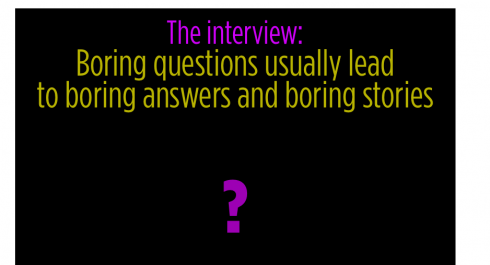
Today I am using this blog platform for a little bit of whining, if I may.
Rarely a week goes by when I am not approached by a university student from somewhere around the globe who is working on a senior project or thesis about visual journalism. In each case, the student seeks an interview with me. In each case, I say yes. In many cases, I am disappointed with the level of preparations and the quality of the questions asked.
Perhaps it is a sign of getting older and more impatient, but I am totally turned off when the first question asked is something that I have said or written about repeatedly, but the student journalist apparently has not done his homework properly.
In the days of Google, I find this difficult to understand.
I remember as a student journalist in the late 60s having our journalism professor, Dr. Arthur Sanderson, remind us NEVER to go out on an interview assignment before gathering all the available information about the person we were interviewing. Of course, there was no Google available to do this from the comfort of our desk, so we went to the library, or the “morgue” as it was called in newsppaers of the era, and pulled out folders filled with yellowed clippings. We started building our story from there, tailoring our questions to that which had not been asked before whenever possible.
Example: this week I got another one of those 20-question questionnaires from a student which begins with:
What is your overall philosophy of design?
Once again, for the 400th time I said:
my philosophy is simple, just make it easy to find, easy to read, and easy on the eyes.
Then there was the student who began his interview with: Which part of Argentina were you born in?
No, sir, wrong country. It was Cuba, did you not try Wikipedia first?
Of course, if the first question already presents such a huge error of fact, I am not inclined to continue with this interview. I then try to use this experience to teach the student a lesson about the basics of doing your homework first.
I remember this student saying: Oh, sir, but you do have an office in Buenos Aires, so I thought you were from Argentina!
Well, I also have an office in Hamburg, but I am not German
And how many times do I have to answer: Which was the most difficult project you ever did?
Die Zeit of Germany: 11 prototypes before we hit the spot
The good questions also come
Sometimes, however, one is happily surprised with the quality of the questions.
An Australian graduate student working on a thesis recently wrote me: Dr. Garcia, I don’t wish to take too much of your time, so I have five questions!
I already liked that there were only five questions. Good thinking. A person who can narrow down choices to a few.
Then surprise #2, very new and fresh questions like:
Dr. Garcia, you have 10 grandchildren, do you think that the youngest one will ever read anything in print when he grows up?
Hmmmmmmm, that one makes me think! I would like to inspire him to develop a love for stories, for learning and for the magic of words in transporting us to many different worlds. I will teach him that contact between hand and paper is, well, an experience. But if you wish to have a quick, spontaneous answer: chances are little David will be moving his fingers on a screen. As long as I am in this world, however, I will continue to give all my grandkids books, in the traditional sense of the word
Dr. Garcia, so you arrive at a media house as a consultant, and they are about to start a new newspaper: would you suggest that they only do a digital edition, and nothing printed, or would you suggest both editions
It is 2010, and print lives and thrives in many parts of the world. So, depending on where this newsroom happened to be in the universe, I would take that into account. However, chances are that I would suggest a multi-platform publishing strategy, with print as an essential part of the process: mobile, online, print, tablet. This is the quartet that will make media houses thrive for years to come. Let’s not dismiss print like we do a fly away from our face. Not at all. Not yet, perhaps not ever
You see, those are the questions that make you stop and think——or rethink. They stimulate you and provide the interviewer with better material.
Professor Sanderson would give the Australian student an A+ for the quality of his questions, which goes to prove that some things will never change at the core of what we do, starting with how we prepare for an assignment and how we push our sources to give us the best. A stimulated source will provide you with a stimulating story.
A bored source will give you nothing, go on robot mode, or, if less diplomatic, send you back to do your homework.
The Follow Up: The four-course French newspaper lunch
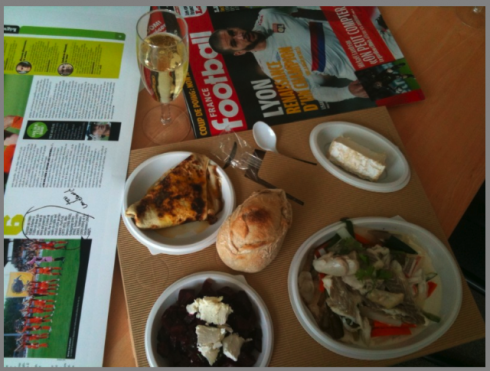
Yesterday we talked about the virtues of food and how the French relate to it.
Today’s lunch here at L’Equipe came accompanied by a glass of bubblies. Thank you, Walter!
On the menu: fresh beets appetizer, steamed trout and veggies for main course, a thin apple crepe, cheese, 9 grain roll.
For the full entry from yesterday:
https://www.garciamedia.com/blog/articles/eating_in_france